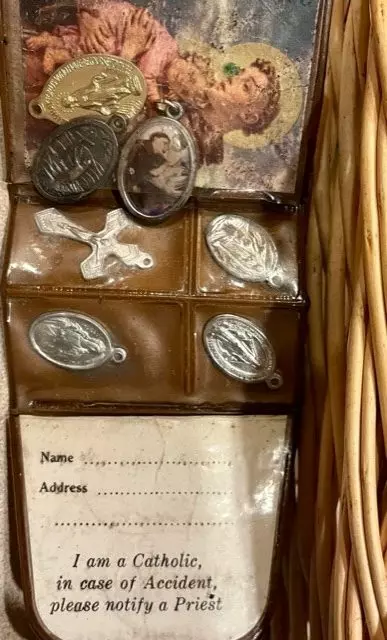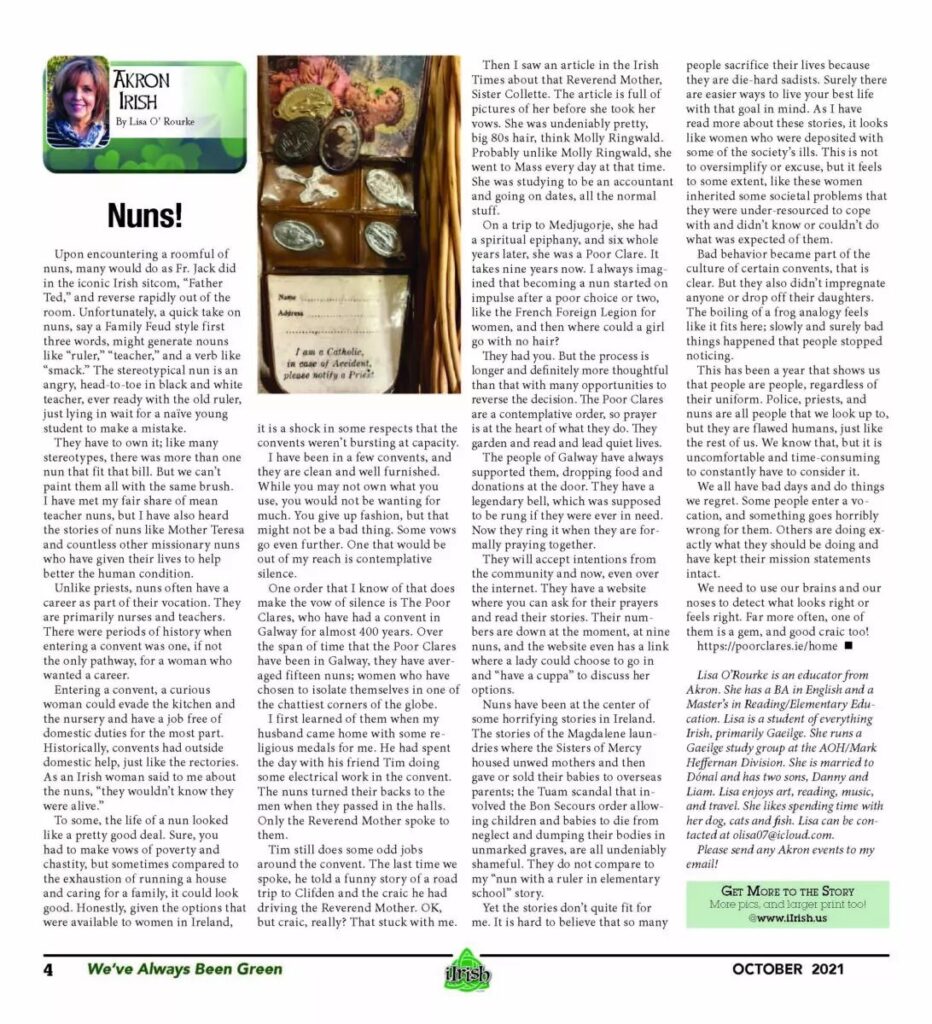Akron Irish: Nuns!
By Lisa O’Rourke
Upon encountering a roomful of nuns, many would do as Fr. Jack did in the iconic Irish sitcom, “Father Ted,” and reverse rapidly out of the room.
Unfortunately, a quick take on nuns, say a Family Feud style first three words, might generate nouns like “ruler,” “teacher,” and a verb like “smack.” The stereotypical nun is an angry, head-to-toe in black and white teacher, ever ready with the old ruler, just lying in wait for a naïve young student to make a mistake.
They have to own it; like many stereotypes, there was more than one nun that fit that bill. But we can’t paint them all with the same brush. I have met my fair share of mean teacher nuns, but I have also heard the stories of nuns like Mother Teresa and countless other missionary nuns who have given their lives to help better the human condition.
Unlike priests, nuns often have a career as part of their vocation. They are primarily nurses and teachers. There were periods of history when entering a convent was one, if not the only pathway, for a woman who wanted a career.
Entering a convent, a curious woman could evade the kitchen and the nursery and have a job free of domestic duties for the most part. Historically, convents had outside domestic help, just like the rectories. As an Irish woman said to me about the nuns, “they wouldn’t know they were alive.”
To some, the life of a nun looked like a pretty good deal. Sure, you had to make vows of poverty and chastity, but sometimes compared to the exhaustion of running a house and caring for a family, it could look good. Honestly, given the options that were available to women in Ireland, it is a shock in some respects that the convents weren’t bursting at capacity.
I have been in a few convents, and they are clean and well furnished. While you may not own what you use, you would not be wanting for much. You give up fashion, but that might not be a bad thing. Some vows go even further. One that would be out of my reach is contemplative silence.
One order that I know of that does make the vow of silence is The Poor Clares, who have had a convent in Galway for almost 400 years. Over the span of time that the Poor Clares have been in Galway, they have averaged fifteen nuns; women who have chosen to isolate themselves in one of the chattiest corners of the globe.

I first learned of them when my husband came home with some religious medals for me. He had spent the day with his friend Tim doing some electrical work in the convent. The nuns turned their backs to the men when they passed in the halls. Only the Reverend Mother spoke to them.
Tim still does some odd jobs around the convent. The last time we spoke, he told a funny story of a road trip to Clifden and the craic he had driving the Reverend Mother. OK, but craic, really? That stuck with me.
Then I saw an article in the Irish Times about that Reverend Mother, Sister Collette. The article is full of pictures of her before she took her vows. She was undeniably pretty, big 80s hair, think Molly Ringwald. Probably unlike Molly Ringwald, she went to Mass every day at that time. She was studying to be an accountant and going on dates, all the normal stuff.
On a trip to Medjugorje, she had a spiritual epiphany, and six whole years later, she was a Poor Clare. It takes nine years now. I always imagined that becoming a nun started on impulse after a poor choice or two, like the French Foreign Legion for women, and then where could a girl go with no hair?
They had you. But the process is longer and definitely more thoughtful than that with many opportunities to reverse the decision. The Poor Clares are a contemplative order, so prayer is at the heart of what they do. They garden and read and lead quiet lives.
The people of Galway have always supported them, dropping food and donations at the door. They have a legendary bell, which was supposed to be rung if they were ever in need. Now they ring it when they are formally praying together.
They will accept intentions from the community and now, even over the internet. They have a website where you can ask for their prayers and read their stories. Their numbers are down at the moment, at nine nuns, and the website even has a link where a lady could choose to go in and “have a cuppa” to discuss her options.
Nuns have been at the center of some horrifying stories in Ireland. The stories of the Magdalene laundries where the Sisters of Mercy housed unwed mothers and then gave or sold their babies to overseas parents; the Tuam scandal that involved the Bon Secours order allowing children and babies to die from neglect and dumping their bodies in unmarked graves, are all undeniably shameful. They do not compare to my “nun with a ruler in elementary school” story.
Yet the stories don’t quite fit for me. It is hard to believe that so many people sacrifice their lives because they are die-hard sadists. Surely there are easier ways to live your best life with that goal in mind. As I have read more about these stories, it looks like women who were deposited with some of the society’s ills. This is not to oversimplify or excuse, but it feels to some extent, like these women inherited some societal problems that they were under-resourced to cope with and didn’t know or couldn’t do what was expected of them.
Bad behavior became part of the culture of certain convents, that is clear. But they also didn’t impregnate anyone or drop off their daughters. The boiling of a frog analogy feels like it fits here; slowly and surely bad things happened that people stopped noticing.
This has been a year that shows us that people are people, regardless of their uniform. Police, priests, and nuns are all people that we look up to, but they are flawed humans, just like the rest of us. We know that, but it is uncomfortable and time-consuming to constantly have to consider it.
We all have bad days and do things we regret. Some people enter a vocation, and something goes horribly wrong for them. Others are doing exactly what they should be doing and have kept their mission statements intact.
We need to use our brains and our noses to detect what looks right or feels right. Far more often, one of them is a gem, and good craic too!
*Lisa O’Rourke is an educator from Akron. She has a BA in English and a Master’s in Reading/Elementary Education. Lisa is a student of everything Irish, primarily Gaeilge. She runs a Gaeilge study group at the AOH/Mark Heffernan Division. She is married to Dónal and has two sons, Danny and Liam. Lisa enjoys art, reading, music, and travel. She likes spending time with her dog, cats and fish. Lisa can be contacted at [email protected].
Please send any Akron events to my email!





